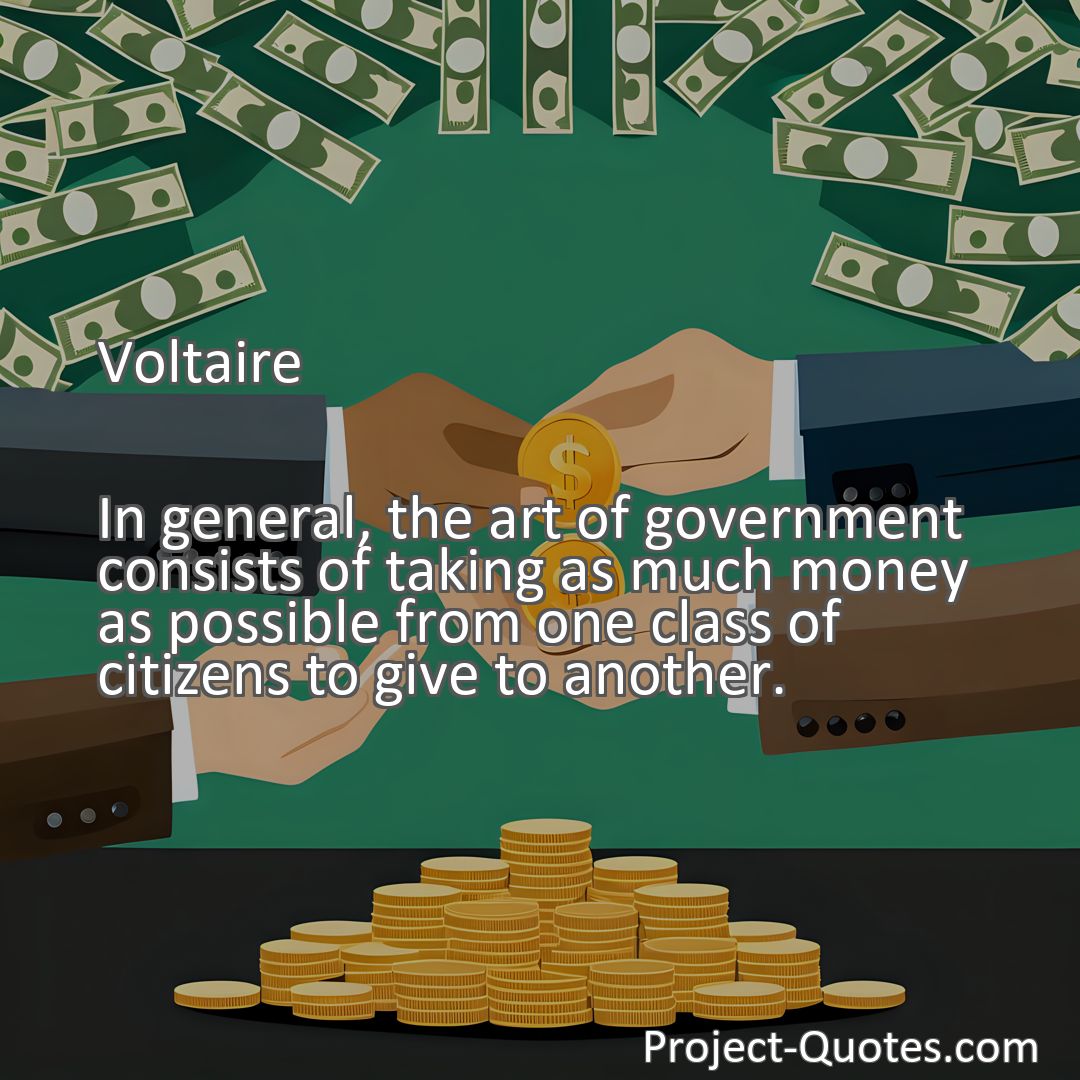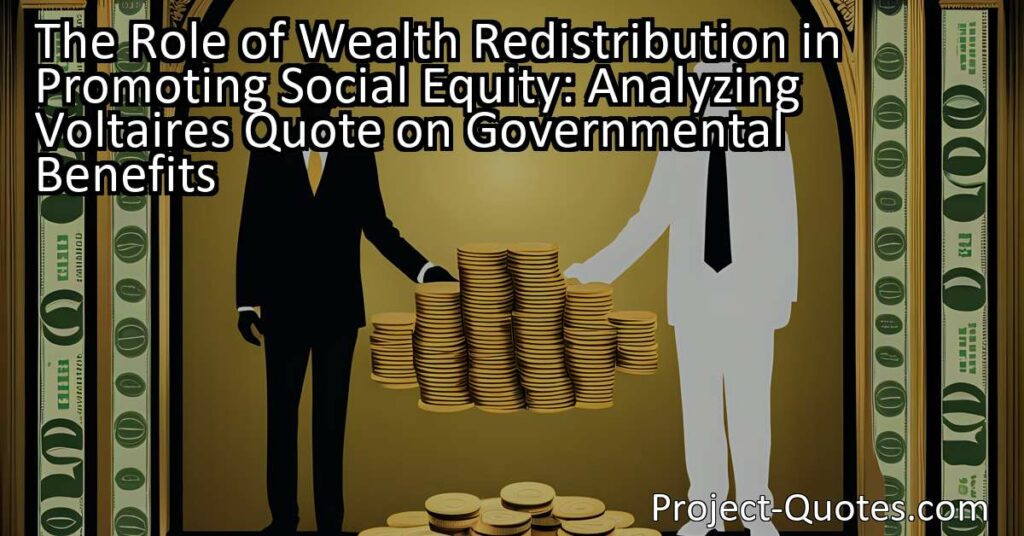In general, the art of government consists of taking as much money as possible from one class of citizens to give to another.
Voltaire
Voltaire’s quote on wealth redistribution prompts us to consider the potential consequences of receiving extensive benefits without adequate effort. Critics argue that this may result in a lack of motivation to work and become self-reliant. However, proponents argue that government programs aimed at redistributing wealth play a crucial role in preventing extreme poverty, promoting social mobility, and fostering collective responsibility. Striking a balance between support and accountability is essential to ensure a fair and just society.
Table of Contents
- 1 In general, the art of government consists of taking as much money as possible from one class of citizens to give to another.
- 2 Voltaire
- 3 Meaning of Quote – In general, the art of government consists of taking as much money as possible from one class of citizens to give to another.
- 4 Freely Shareable Quote Image
- 5 Related
Meaning of Quote – In general, the art of government consists of taking as much money as possible from one class of citizens to give to another.
Voltaire, a famous French writer and philosopher from the 18th century, once stated, “In general, the art of government consists of taking as much money as possible from one class of citizens to give to another.” In this thought-provoking quote, Voltaire sheds light on the concept of wealth redistribution and the role of governments in ensuring social equity.
When examining this statement, it’s important to understand that Voltaire was known for his skepticism and criticism of institutions, including government. As an ardent defender of civil liberties and individual freedom, he often scrutinized the actions of those in power. Voltaire firmly believed that the primary objective of government was to maintain stability while protecting the rights and well-being of all citizens.
While some may interpret Voltaire’s statement as an outright condemnation of wealth redistribution, we can approach it from a more nuanced perspective. It is true that governments often engage in economic policies aimed at redistributing wealth from one class of citizens to another. This can be seen in various forms, such as progressive taxation, social welfare programs, and public services aimed at reducing income inequality.
One of the key justifications for such wealth redistribution lies in the concept of social justice. Advocates argue that it is the government’s duty to address economic disparities and ensure a level playing field for all citizens. By taking money from the wealthier class and allocating it to those in need, the government aims to reduce poverty, provide equal opportunities, and improve overall societal well-being.
However, critics of wealth redistribution contend that it is a violation of individual property rights and personal freedoms. They argue that individuals have a right to keep the fruits of their labor and should not be forced to subsidize others. They claim that government interference in wealth distribution hampers economic growth, disincentivizes hard work, and perpetuates a culture of dependency. These arguments often find resonance among those who espouse free-market capitalism and limited government intervention.
To better understand Voltaire’s quote, we must explore historical and contemporary examples of wealth redistribution. Throughout history, various governments have implemented policies aimed at redistributing wealth. One such example is the welfare state model, which emerged post-World War II in several European countries. These nations adopted policies that provided social security, healthcare, and other benefits to citizens, funded through progressive taxation and redistribution of resources.
Looking at the United States, it is essential to examine the welfare programs implemented by the government. The Social Security system, launched in 1935, aimed to provide economic security for elderly and disabled citizens through a federal pension scheme. Similarly, the Supplemental Nutrition Assistance Program (SNAP), commonly known as food stamps, assists low-income families in purchasing food. These programs rely on taxes collected from higher-income individuals and corporations to support those who are in need.
Critics of such government programs argue that they can create a disincentive for individuals to work and contribute actively to society. They contend that if people receive extensive benefits without adequate effort, they may lose motivation to seek employment and become self-reliant. However, proponents emphasize the role of these programs in preventing extreme poverty, promoting social mobility, and fostering a sense of collective responsibility.
Another aspect to consider is the aim to reduce income inequality. As societies become more prosperous, the gap between rich and poor often widens. In response, governments may introduce policies that aim to redistribute wealth and narrow this gap. For instance, some countries implement a progressive tax system, where higher-income individuals are taxed at a higher rate. This approach ensures that those who have more contribute proportionally more to society and its welfare.
However, it is essential to strike a balance when implementing wealth redistribution measures. Excessive taxation or excessive redistribution can disincentivize wealth creation, innovation, and entrepreneurship. This delicate balancing act is crucial to maintaining economic growth, while also addressing social inequalities.
Voltaire’s quote invites us to critically examine the role of government in wealth redistribution. Understanding both the benefits and potential drawbacks of such policies allows us to work towards a fair and just society. While there may always be debates on the best approaches, it is crucial to remember that the ultimate goal should be the well-being of all citizens.
In conclusion, Voltaire’s quote captures the essence of the art of government. Wealth redistribution, as a key component of governance, plays a vital role in ensuring social equity. While critics may argue against government interference in wealth distribution, proponents advocate for the importance of addressing economic disparities and ensuring social justice. By finding the right balance, government policies can promote economic growth while also working towards a fair and inclusive society.
I hope this quote inspired image brings you hope and peace. Share it with someone who needs it today!


